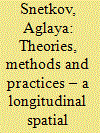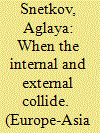| Srl | Item |
| 1 |
ID:
153112


|
|
|
|
|
| Summary/Abstract |
How do securitizing actors go about desecuritizing policy issues that have been securitized across multiple spatially bounded referent objects? Do such desecuritizations develop as a single or manifold process and with what political effect? And critically, how do we methodologically approach the study of such processes? These are pertinent questions that have been left underexamined in the (de)securitization literature. In seeking to fill this gap, this article makes two main points. First, it calls for a greater focus on the study of (de)securitizations that are constructed according to multiple spatially bounded referent objects, and on how these diverging strands of discourse and practice shape the overarching process. Second, it argues for a greater use of longitudinal methods of analysis as a better way to capture the evolutionary dynamics of desecuritization processes, which (re)constitute security policies and agendas. To illustrate these claims, the article considers the empirical case of Russia’s (de)securitization of insurgent threats since 2000 by tracing this process over a longitudinal period and across three spatial-referent objects, namely the local level: Chechnya; the sub-federal level: North Caucasus; and the national level: Russia.
|
|
|
|
|
|
|
|
|
|
|
|
|
|
|
|
| 2 |
ID:
112156


|
|
|
|
|
| Publication |
2012.
|
| Summary/Abstract |
This study provides a social constructivist reading of Russia's security policy under President Vladimir Putin, by investigating the relationship between the internal and the external security spheres and state identity through the prism of Russia's narrative on the fight against terrorism. Drawing on social constructivist theories of identity, security and narratives, it argues that a change occurred in the Putin regime's conceptualisation of Russian state identity: from an initially weak state which prioritised internal security threats and the fight against terrorism, to a strong state, whose main security 'Other' was the West, by the end of Putin's presidency. This resulted in less priority being given to the terrorism issue in the official discourse and the widening of the notion of 'threat' and 'terrorism', in line with a developing security narrative in both internal and external spheres.
|
|
|
|
|
|
|
|
|
|
|
|
|
|
|
|